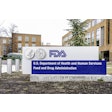The American Feed Industry Association (AFIA) has submitted comments to the U.S. Food and Drug Administration (FDA) on its draft guidance on Hazard Analysis and Risk-Based Preventive Controls (HA/PC) for Food for Animals. The 38-page comments affirm the animal feed industry’s commitment to a “full and successful implementation of FSMA” across its varied industries but urges the agency to take a flexible approach when regulating under this rule.
“The importance of a flexible rule and guidance document cannot be underestimated in our dynamic, very diverse industry,” stated AFIA’s Richard Sellers, senior vice president of public policy and education, and AFIA’s Leah Wilkinson, vice president of public policy and education, in the letter. “We continue to urge the agency to extend its flexibility rationale and approach to its inspection staff, both state and federal. Companies will have many ways of reaching the same goal of animal food safety and should be allowed to use a variety of approaches.”
The HA/PC regulation is designed to help animal feed manufacturers minimize the risks of known or reasonably foreseeable food safety hazards (e.g., chemical, biological or physical) that may cause illness or injury if not controlled. However, the FDA acknowledged through the draft guidance, and AFIA agrees, that not every facility will identify hazards that require a preventive control, therefore no preventive controls will need to be implemented. By taking a flexible approach, the agency can ensure via these rules that the company takes proper action to control hazards that cannot be controlled through Current Good Manufacturing Practices.
Overall, AFIA found the draft guidance to be comprehensive, but provided several suggested changes and comments. Among those, AFIA cautioned that:
- Any lists used in the guidance could be construed by investigators and employees as “checklists,” which may not be the case
- Taking a “kitchen sink” approach when it comes to providing a lengthy list of outdated references, older than 10 years, is “neither justified nor scientifically defensible”
- Where the guidance applies specifically to pet food manufacturers should be better defined.
AFIA also expressed its concern with the continued delay in the agency’s release of the remaining guidance materials and urged the FDA to extend its inspection dates by at least a year in order to properly train inspectors and educate industry.
“This is said to be the first five chapters, which means there are more chapters to come and more delays,” Sellers and Wilkinson said. “If all the final documents are not out in reasonable time, AFIA will be requesting more inspection delays.”
“Large” manufacturing facilities, or those with 500 or more employees, had to comply with the HA/PC regulations by September 2017, and the remaining “small” facilities, or those with fewer than 500 employees, must be in compliance by September 17, 2018.
The food and feed industries originally supported FSMA, which, among other provisions, authorized the FDA to promulgate new rules for preventive controls, develop performance standards, create new administrative detention rules, recall adulterated products and hire more than 4,000 new field staff. It is estimated that if fully implemented, the law will cost the U.S. animal feed and pet food industries more than $1 billion with little improvement to animal health, animal food safety or other real benefit.














